Serving 796 students in grades 6-8, Woodward Park Middle School ranks in the bottom 50% of all schools in Ohio for overall test scores (math proficiency is bottom 50%, and reading proficiency is bottom 50%).
The percentage of students achieving proficiency in math is 24% (which is lower than the Ohio state average of 52%). The percentage of students achieving proficiency in reading/language arts is 32% (which is lower than the Ohio state average of 60%).
The student:teacher ratio of 17:1 is equal to the Ohio state level of 17:1.
Minority enrollment is 88% of the student body (majority Black), which is higher than the Ohio state average of 34% (majority Black and Hispanic).
Quick Stats (2025)
- Grades: 6-8
- Enrollment: 796 students
- Student:Teacher Ratio: 17:1
- Minority Enrollment: 88%
- Overall Testing Rank: Bottom 50% in OH
- Math Proficiency: 24% (Btm 50%)
- Reading Proficiency: 32% (Btm 50%)
- Science Proficiency: 54% (Btm 50%)
- Source: National Center for Education Statistics (NCES), OH Dept. of Education
Top Rankings
Woodward Park Middle School ranks among the top 20% of public schools in Ohio for:
Category
Attribute
Diversity
Percent Eligible For Free Lunch
School Overview
Woodward Park Middle School's student population of 796 students has declined by 13% over five school years.
The teacher population of 47 teachers has grown by 30% over five school years.
Grades Offered
Grades 6-8
Total Students
796 students
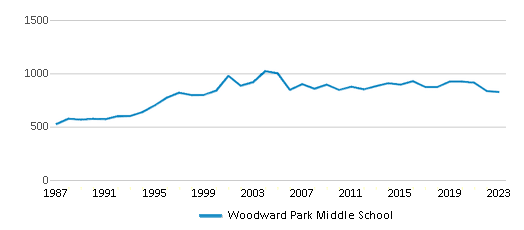
Gender %
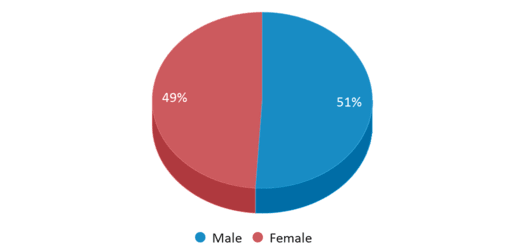
Total Classroom Teachers
47 teachers
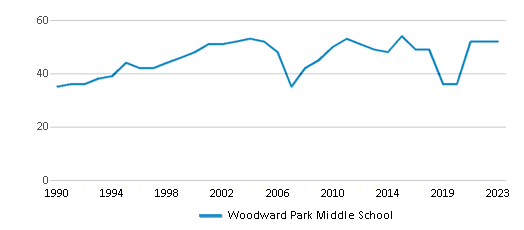
Students by Grade
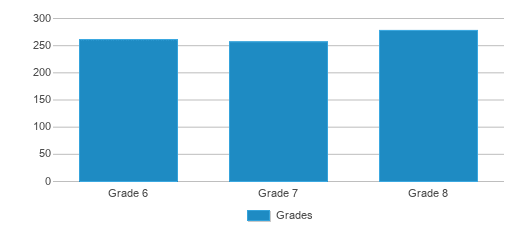
School Rankings
Woodward Park Middle School ranks within the bottom 50% of all 3,241 schools in Ohio (based off of combined math and reading proficiency testing data).
The diversity score of Woodward Park Middle School is 0.66, which is more than the diversity score at state average of 0.53. The school's diversity has stayed relatively flat over five school years.
Overall Testing Rank
#2643 out of 3241 schools
(Bottom 50%)
(Bottom 50%)
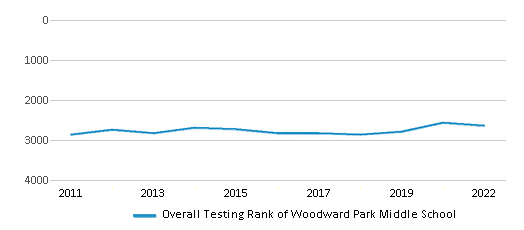
Math Test Scores (% Proficient)
24%
52%
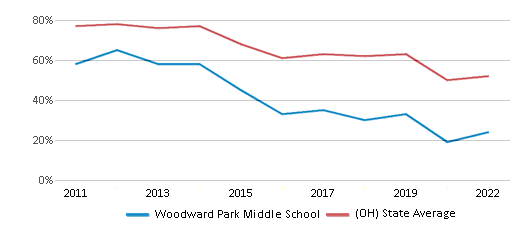
Reading/Language Arts Test Scores (% Proficient)
32%
60%
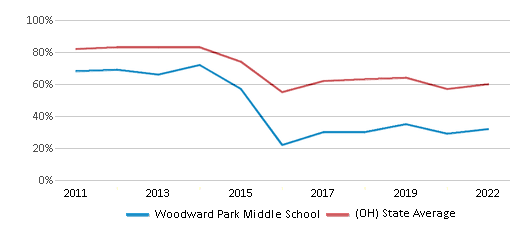
Science Test Scores (% Proficient)
54%
63%
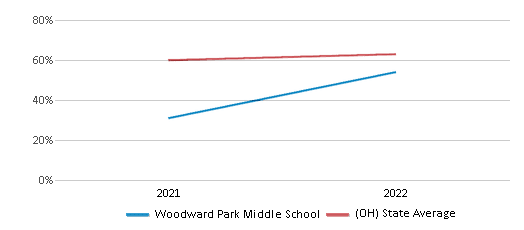
Student : Teacher Ratio
17:1
17:1
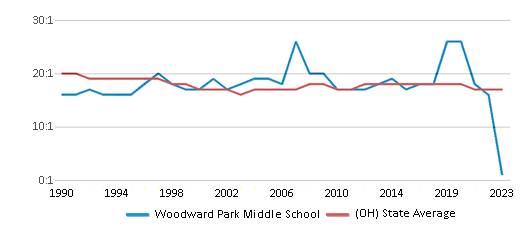
American Indian
n/a
n/a
Asian
8%
3%
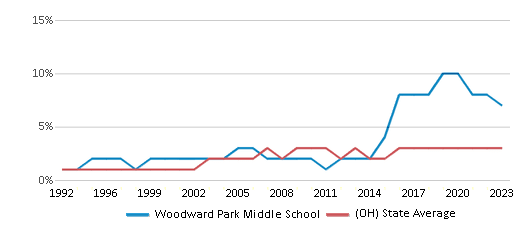
Hispanic
22%
8%
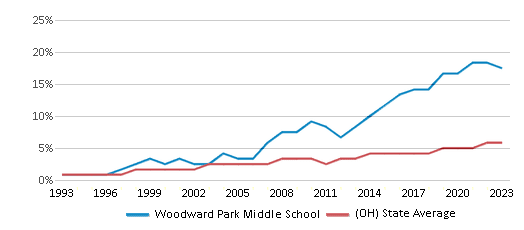
Black
52%
17%
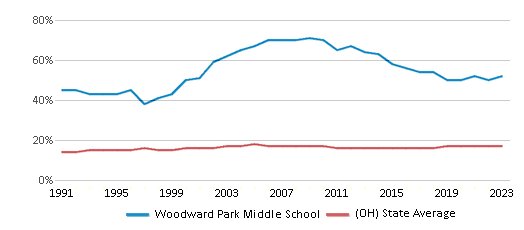
White
12%
66%
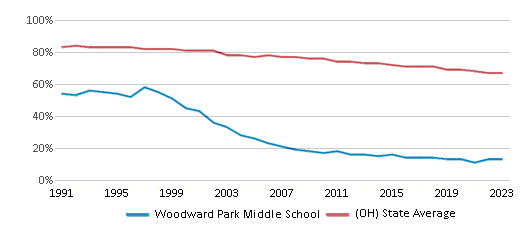
Hawaiian
n/a
n/a
Two or more races
6%
6%
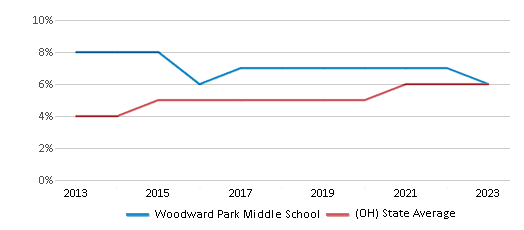
All Ethnic Groups
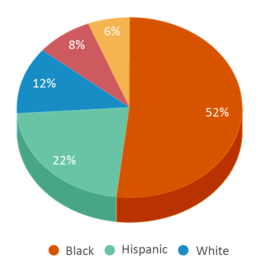
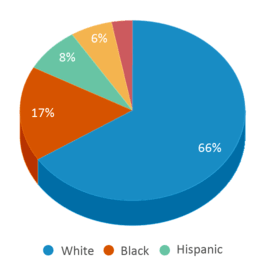
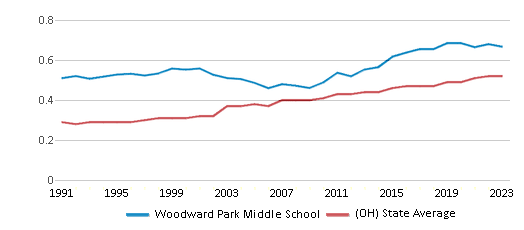
Participates in the National School Lunch Program (NSLP)
Yes
Eligible for Free Lunch
94%
42%
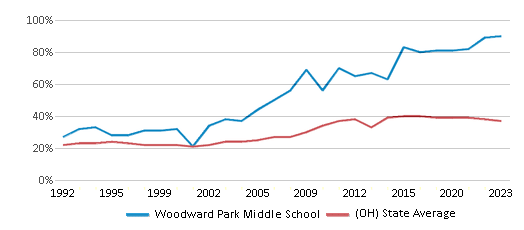
Eligible for Reduced Lunch (13-14)
5%
5%
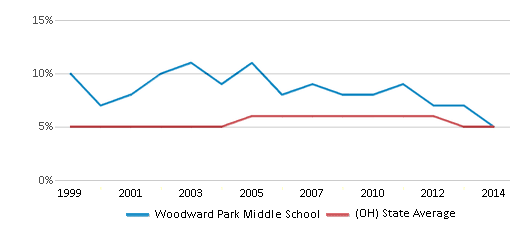
School Statewide Testing
School District Name
Source: National Center for Education Statistics (NCES), OH Dept. of Education
Profile last updated: 02/09/2025
Frequently Asked Questions
What is Woodward Park Middle School's ranking?
Woodward Park Middle School is ranked #2643 out of 3,241 schools, which ranks it among the bottom 50% of public schools in Ohio.
What percent of students have achieved state testing proficiency in math and reading?
24% of students have achieved math proficiency (compared to the 52% OH state average), while 32% of students have achieved reading proficiency (compared to the 60% OH state average).
How many students attend Woodward Park Middle School?
796 students attend Woodward Park Middle School.
What is the racial composition of the student body?
52% of Woodward Park Middle School students are Black, 22% of students are Hispanic, 12% of students are White, 8% of students are Asian, and 6% of students are Two or more races.
What is the student:teacher ratio of Woodward Park Middle School?
Woodward Park Middle School has a student ration of 17:1, which is equal to the Ohio state average of 17:1.
What grades does Woodward Park Middle School offer ?
Woodward Park Middle School offers enrollment in grades 6-8
What school district is Woodward Park Middle School part of?
Woodward Park Middle School is part of Columbus City Schools School District.
In what neighborhood is Woodward Park Middle School located?
Woodward Park Middle School is located in the Northland neighborhood of Columbus, OH. There are 25 other public schools located in Northland.
School Reviews
4 3/10/2018
I have had 4 children attend WPMS and overall it is not a bad school. As with any school, there have been a few teachers who speak to kids in a manner they shouldn't. I think the kids are pretty typical, not that many fights, school is usually pretty clean (can't speak on the restrooms since I don't recall ever being in them, but I have seen plenty of selfies taken in them and it appears to be above par. Their sports programs for boys and girls are great (volleyball, soccer, basketball, baseball, softball), band, choir, orchestra available. Some of the issues I have would be more with the district (ALEKS requirements in addition to normal math homework, and lack of in school time to complete since not all students have access to computers/internet). Love Mr. Jones (8th grade admin). Test scores may not be that great but I believe this is once again a district issue more so than the school.
2 12/6/2011
it a very good school and no fights no bad langue a schools you the parents will want to send your kids to
Review Woodward Park Middle School. Reviews should be a few sentences in length. Please include any comments on:
- Quality of academic programs, teachers, and facilities
- Availability of music, art, sports and other extracurricular activities
Recent Articles

What Is A Charter School?
Explore the world of charter schools in this comprehensive guide. Learn about their history, how they operate, and the pros and cons of this educational innovation. Discover key facts about charter schools, including admission policies, demographics, and funding, as well as what to look for when considering a charter school for your child.

10 Reasons Why High School Sports Benefit Students
Discover the 10 compelling reasons why high school sports are beneficial for students. This comprehensive article explores how athletics enhance academic performance, foster personal growth, and develop crucial life skills. From improved fitness and time management to leadership development and community representation, learn why participating in high school sports can be a game-changer for students' overall success and well-being.

February 05, 2025
Understanding the U.S. Department of Education: Structure, Impact, and EvolutionWe explore how the Department of Education shapes American education, from its cabinet-level leadership to its impact on millions of students, written for general audiences seeking clarity on this vital institution.









